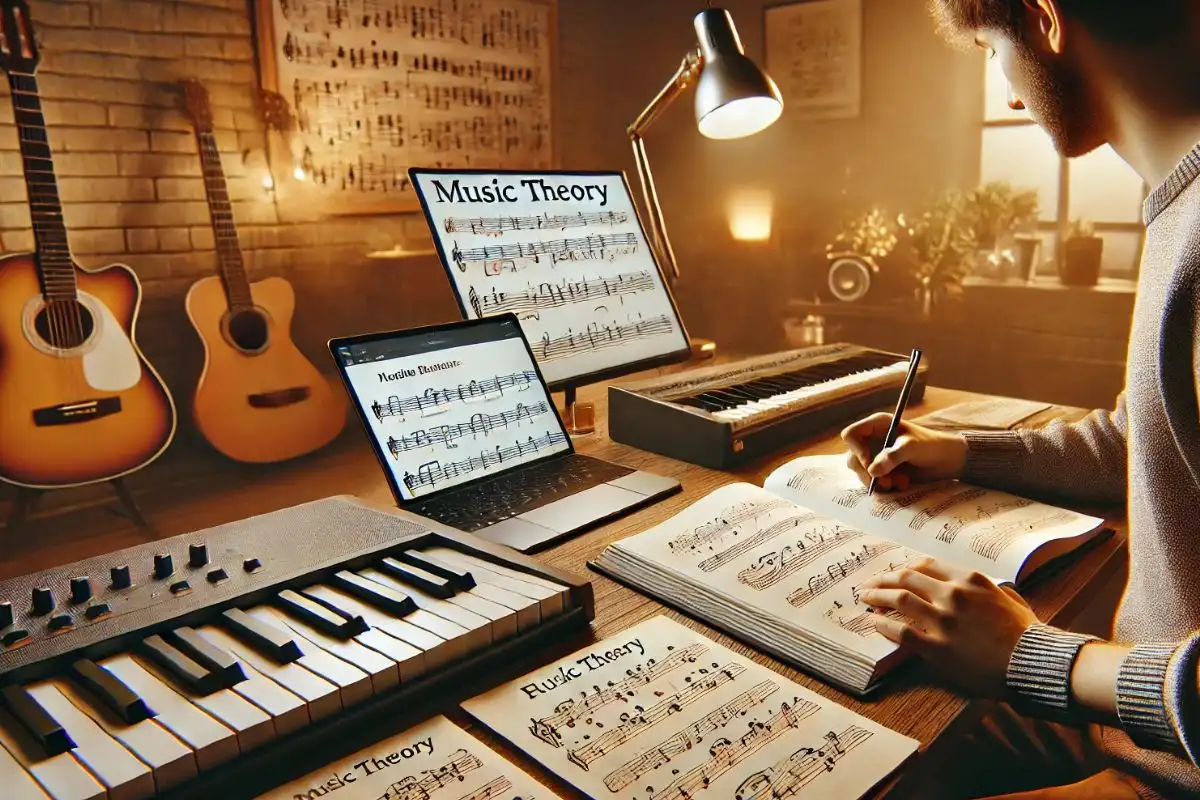Music theory is often regarded as the language of music. It provides the tools to understand how melodies, harmonies, and rhythms come together to create songs. While some beginners may feel intimidated by the idea of studying theory, it’s a vital component of musical development that can significantly enhance your skills and creativity. In this article, we’ll explore the role of music theory in becoming a better musician and how to incorporate it into your learning journey.
What Is Music Theory?
Music theory is the study of the structure and elements of music. It explains the relationships between notes, chords, scales, and rhythms, allowing musicians to understand how music works on a fundamental level.
Key Elements of Music Theory:
- Notes: The building blocks of melody and harmony.
- Scales: Patterns of notes arranged by pitch.
- Chords: Combinations of notes played simultaneously.
- Rhythm: The timing and pattern of beats in music.
- Key Signatures: Indicate the tonal center of a piece.
By learning these components, musicians gain insight into the mechanics of music and how to apply them in practice.
Why Is Music Theory Important?
1. Enhances Creativity
Understanding music theory doesn’t limit creativity—it expands it. By knowing how chords and scales work, you can experiment with new sounds, compose original pieces, and improvise confidently.
2. Improves Communication
Music theory acts as a universal language that allows musicians to communicate effectively. Whether you’re playing in a band, teaching, or collaborating with others, theory provides a shared vocabulary to discuss ideas.
3. Accelerates Learning
Theory helps you decode sheet music, recognize patterns, and understand why certain progressions work. This reduces guesswork and speeds up your ability to learn new pieces.
4. Builds Confidence
When you know the “why” behind what you’re playing, you gain confidence in your abilities. This understanding allows you to approach complex pieces with greater ease.
How Music Theory Makes You a Better Musician
Mastering Scales and Modes
Scales are the foundation of melodies and harmonies. Learning major, minor, and modal scales enhances your ability to navigate your instrument and improvise.
Practical Application:
- Use scales to practice finger exercises and warm-ups.
- Experiment with creating melodies using different modes, such as Dorian or Mixolydian.
Understanding Chord Progressions
Chord progressions are the backbone of most songs. By studying theory, you’ll learn common progressions like I-IV-V or ii-V-I and understand how to create tension and resolution in your music.
Practical Application:
- Analyze your favorite songs to identify their chord progressions.
- Practice creating your own progressions to build original compositions.
Reading Sheet Music and Tabs
Music theory simplifies the process of reading and interpreting sheet music or tabs. Understanding notation, key signatures, and time signatures allows you to approach new material with confidence.
Practical Application:
- Start with simple pieces to familiarize yourself with notation.
- Gradually tackle more complex compositions as your skills improve.
Developing Rhythmic Precision
Theory provides the tools to understand rhythm, including note values, rests, and time signatures. This knowledge helps you maintain consistent timing and play more expressively.
Practical Application:
- Practice clapping or tapping rhythms before playing them on your instrument.
- Use a metronome to improve your timing and precision.
Enhancing Improvisation Skills
Improvisation becomes more accessible with a solid foundation in theory. Knowing scales, chord tones, and progressions allows you to create melodies on the spot.
Practical Application:
- Improvise over backing tracks using the pentatonic or blues scale.
- Experiment with different phrasing and dynamics to add variety.
Overcoming Common Misconceptions About Music Theory
1. “Music Theory Limits Creativity”
Some beginners fear that studying theory will make their music feel mechanical. In reality, theory provides tools to unlock creativity by offering new possibilities for expression.
2. “It’s Too Complicated”
While music theory can seem overwhelming at first, starting with the basics makes it manageable. Focus on one concept at a time, such as learning the major scale or understanding key signatures.
3. “You Don’t Need Theory to Be a Good Musician”
While it’s true that some musicians succeed without formal theory knowledge, understanding theory can dramatically accelerate your growth and open doors to new opportunities.
How to Start Learning Music Theory
1. Begin with the Basics
Start with fundamental concepts like note names, intervals, and simple scales. Build on these foundations as you progress.
2. Use Online Resources
Websites, apps, and YouTube tutorials offer accessible and engaging ways to learn theory at your own pace.
3. Take Lessons
Working with a teacher who understands theory can provide personalized guidance and help you apply concepts to your instrument.
4. Practice Daily
Incorporate theory exercises into your practice routine. For example, spend a few minutes each day identifying intervals or analyzing chord progressions.
5. Apply Theory to Your Music
The best way to internalize theory is to use it. Experiment with creating chord progressions, improvising melodies, or analyzing your favorite songs.
Advanced Applications of Music Theory
Once you’ve mastered the basics, explore advanced topics like:
- Counterpoint: The art of combining melodies.
- Harmonic Analysis: Understanding the function of chords within a piece.
- Orchestration: Arranging music for different instruments.
These concepts will deepen your understanding of music and allow you to create more complex and sophisticated compositions.
Final Thoughts
Music theory is a powerful tool that enhances every aspect of musicianship, from creativity and communication to technical skill and confidence. While it may seem intimidating at first, starting with the basics and applying them to your practice can make theory an enjoyable and rewarding part of your musical journey. Remember, theory isn’t about rules—it’s about understanding the possibilities of music and unlocking your full potential as a musician.

